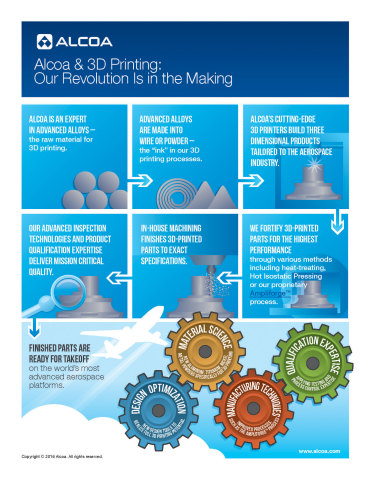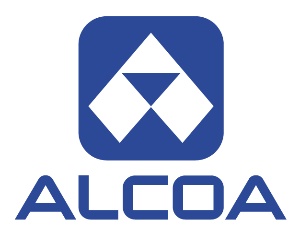NEW YORK--(BUSINESS WIRE)--Lightweight metals leader Alcoa (NYSE:AA) has entered into an agreement with Airbus to supply 3D-printed titanium fuselage and engine pylon components for Airbus commercial aircraft. Alcoa expects to deliver the first additive manufactured parts to Airbus in mid-2016.
“We are proud to partner with Airbus to help pave the way to the future of aerospace development and manufacturing,” said Alcoa Chairman and Chief Executive Officer Klaus Kleinfeld. “The unique combination of our multi-material alloy development expertise, powder production capabilities, aerospace manufacturing strength and product qualification know-how position us to lead in this exciting, emerging space.”
Airbus chose to work with Alcoa because of its comprehensive capabilities, from materials science leadership to additive manufacturing and aerospace parts qualification. The agreement will draw on Alcoa’s decades of aerospace experience and new technologies gained through the recent acquisition of RTI and organic expansion in Whitehall, Michigan. Alcoa also recently invested in 3D-printing and metallic powder production capabilities at its technical center outside of Pittsburgh, Pennsylvania.
- Last year, Alcoa acquired RTI International Metals (RTI)—now known as Alcoa Titanium & Engineered Products (ATEP)—which grew Alcoa’s additive manufacturing capabilities to include 3D-printed titanium and specialty metals parts produced at ATEP’s Austin, Texas facility. The Airbus agreement will draw on these capabilities as well as ATEP’s titanium ingot melting and billetizing, machining, finishing and inspection technologies.
- Alcoa will employ advanced CT scan and Hot Isostatic Pressing (HIP) capabilities at its advanced aerospace facility in Whitehall, Michigan. HIP is a technology that strengthens the metallic structures of traditional and additive manufactured parts made of titanium and nickel based superalloys. Through a $22 million investment in the technology in Whitehall, Michigan, Alcoa today owns and operates one of the largest aerospace HIP technology complexes in the world.
- Additionally, Alcoa is bolstering its additive manufacturing capabilities through a $60 million expansion in advanced 3D-printing materials and processes, including metallic powders. The expansion is located at the Alcoa Technical Center near Pittsburgh, Pennsylvania, the world’s largest light metals research center.
Details of this agreement with Airbus were not disclosed.
Alcoa Aerospace
Alcoa’s aerospace businesses will form part of the Value-Add Company, to be named Arconic, following Alcoa’s separation in the second half of 2016. Arconic will be a premier innovator of high performance multi-material products and solutions in attractive growth markets, including aerospace. This agreement is Alcoa’s latest with Airbus, building on last year’s fastening systems agreement valued at approximately $1 billion. That deal was Alcoa’s largest fastener contract ever with the aircraft manufacturer. Alcoa’s fasteners fly on every Airbus platform.
About Alcoa
A global leader in lightweight metals technology, engineering and manufacturing, Alcoa innovates multi-material solutions that advance our world. Our technologies enhance transportation, from automotive and commercial transport to air and space travel, and improve industrial and consumer electronics products. We enable smart buildings, sustainable food and beverage packaging, high-performance defense vehicles across air, land and sea, deeper oil and gas drilling and more efficient power generation. We pioneered the aluminum industry over 125 years ago, and today, our more than 60,000 people in 30 countries deliver value-add products made of titanium, nickel and aluminum, and produce best-in-class bauxite, alumina and primary aluminum products. For more information, visit www.alcoa.com, follow @Alcoa on Twitter at www.twitter.com/Alcoa and follow us on Facebook at www.facebook.com/Alcoa.
In the second half of 2016, Alcoa will separate into two industry-leading, Fortune 500 companies. The innovation and technology-driven Value-Add Company will include Global Rolled Products, Engineered Products and Solutions, and Transportation and Construction Solutions. The globally competitive Upstream Company will comprise five strong business units that today make up Global Primary Products—Bauxite, Alumina, Aluminum, Cast Products and Energy.
Forward Looking Statements Forward-Looking Statements
This release contains statements that relate to future events and expectations and as such constitute forward-looking statements within the meaning of the Private Securities Litigation Reform Act of 1995. Forward-looking statements include those containing such words as “anticipates,” “estimates,” “expects,” “may,” “plans,” “projects,” “should,” “will,” “would,” or other words of similar meaning. All statements that reflect Alcoa’s expectations, assumptions or projections about the future other than statements of historical fact are forward-looking statements, including, without limitation, statements regarding the separation transaction; the future performance of Value-Add Company if the separation is completed; projections of competitive position, market share, growth opportunities, revenues or other financial items of Value-Add Company; the expected timing of completion of the separation; and projections regarding growth of the aerospace and other end markets. Forward-looking statements are not guarantees of future performance and are subject to risks, uncertainties, and changes in circumstances that are difficult to predict. Although Alcoa believes that the expectations reflected in any forward-looking statements are based on reasonable assumptions, it can give no assurance that these expectations will be attained and it is possible that actual results may differ materially from those indicated by these forward-looking statements due to a variety of risks and uncertainties. Such risks and uncertainties include, but are not limited to: (a) uncertainties as to the timing of the separation and whether it will be completed; (b) the possibility that various closing conditions for the separation may not be satisfied; (c) failure of the separation to qualify for the expected tax treatment; (d) the possibility that any third-party consents required in connection with the separation will not be received; (e) the impact of the separation on the businesses of Alcoa; (f) the risk that the businesses will not be separated successfully or such separation may be more difficult, time-consuming or costly than expected, which could result in additional demands on Alcoa’s resources, systems, procedures and controls, disruption of its ongoing business and diversion of management’s attention from other business concerns; (g) the potential failure to retain key employees while the separation transaction is pending or after it is completed; (h) deterioration in global economic and financial market conditions generally; (i) unfavorable changes in the markets served by Alcoa, including the aerospace market; (j) Alcoa’s inability to realize expected benefits, in each case as planned and by targeted completion dates, from the separation transaction or from acquisitions and expansions; and (k) the other risk factors discussed in Alcoa’s Form 10-K for the year ended December 31, 2015, and other reports filed with the U.S. Securities and Exchange Commission. Alcoa disclaims any obligation to update publicly any forward-looking statements, whether in response to new information, future events or otherwise, except as required by applicable law. Market projections are subject to the risks discussed above and other risks in the market.




